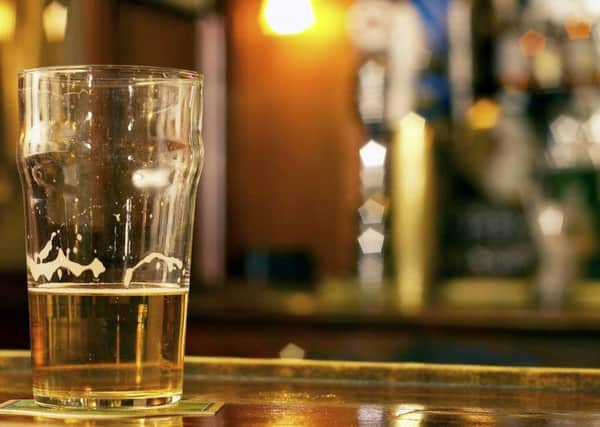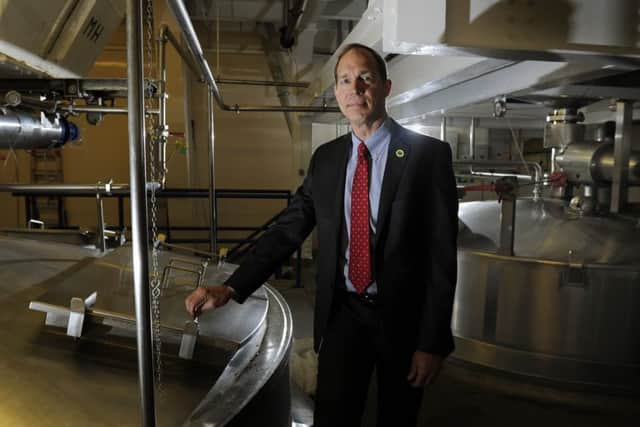Storm brewing for Yorkshire's pubs as average pint passes £3


It has been obvious for a while to anyone who enjoys a tipple during a meal or on a night out, but new figures have finally confirmed that the average price of a pint how named passed the psychological barrier of £3.
While customers may be coughing up considerably more for a drink than they did a decade or even a year ago, those in the industry in Yorkshire say it is the taxman rather landlords who are the main beneficiaries - with many pubs struggling to stay afloat as they struggle to deal with rising costs, swathes of new legislation and tough competition from the allure of supermarket drink offers at rock-bottom prices.
Advertisement
Hide AdAdvertisement
Hide AdEarlier this year, research by The Yorkshire Post revealed that almost 700 pubs have closed in Yorkshire in the past decade, with rural areas particularly badly-hit.


The region continues to support more than 4,600 pubs and 144 breweries, employing over 80,000 people in the process, but there are growing concerns that those numbers will continue to fall as hard-pressed consumers abandon evenings out for cheaper nights-in with friends and family.
New statistics from The British Beer & Pub Association (BBPA) show the average price of a pint of bitter in Britain’s pubs has broken through the £3 barrier for the first time, up by six pence on 2016.
The figure has fuelled concerns over whether November’s Budget will see the Government raising beer duty for a second time this year. Chancellor Philip Hammond announced a 2p-a-pint increase on beer in March. The overall 2017 price rise for bitter was the biggest since 2014, and the price of a pint of lager rose even more, by ten pence, from £3.48 to £3.58.
Advertisement
Hide AdAdvertisement
Hide AdIn Yorkshire, the average price of a pint of beer is now £3.23, above what is paid in places like the North-East and Wales but still comfortably below London’s eye-watering standard cost of £4.13. Yorkshire cider drinkers can expect to pay £3.55 for a pint, while wine lovers can get a 175ml glass of their favourite tipple for £3.82.


The BBPA says UK beer duty is 60 per cent higher than in 2000, and among the highest in the European Union. But more positively, Britain has seen a huge explosion in the number of breweries, which topped 2,000 for the first time in 2016, at 2,250.
Brigid Simmonds, chief executive of the BBPA, says: “The taxes on UK beer are still a huge cause for concern, and we cannot afford another beer duty hike in the November Budget, if we are to keep a pint in the pub affordable for British beer drinkers.
“However, a wealth of other data, shows that with the right policies, the beer and pub industry, which supports 900,000 jobs, can continue to help grow the economy, creating new jobs and more opportunities for the people who work in our sector.”
Advertisement
Hide AdAdvertisement
Hide AdKeighley-based brewer Timothy Taylor & Co, which also runs 19 pubs in Yorkshire and one in Lancashire, is experiencing at first hand the different pressures on the industry.
Chief executive Tim Dewey says while there are plenty of reasons for optimism for brewers, there are also legitimate concerns for the future of the pub industry.
He says one reason for the average price of a pint of bitter rising is down to the success of the industry in getting people to buy “better quality and more interesting pints” that are higher strength and more expensive. But he says that the increasing popularity of craft ales is very far from the whole story.
“As an industry, we want people to value our products. But the other side of the coin is the horrendous cost pressures hitting the industry - some of which are well publicised and others that are less publicised but have no less of an impact.”
Advertisement
Hide AdAdvertisement
Hide AdDewey reels off the litany of regulatory changes that came into force this April and included increases to the minimum wage, alterations to business rates, the introduction of an Apprenticeship Levy and a requirement to be part of a new Alcohol Wholesaler Registration Scheme.
“It is just one thing after another. When you look at each individual policy you could say perhaps this is no bad thing but it is another thing and another thing and another thing to deal with. The cumulative effect ends up getting reflected in the consumer prices.”
Dewey says one under-the-radar cost relates to potential changes to the extension of low-emission zones across the country, which penalise high-polluting vehicles.
While companies have put in detailed financial plans to change their delivery vehicles so they comply with the new standards, he says firms are subject to political whims which are changing implementation dates at short notice. In April this year, it was announced that London’s new Ultra Low Emission Zone is now due to come into force from 2019 rather than 12 months later as previously planned,
Advertisement
Hide AdAdvertisement
Hide AdDewey says the Government should be looking to cut beer duty “or at the very least freeze it” in November’s budget. He also believes there should be a “fundamental reevaluation” of the business rates demanded of pubs. He cites an example of one of the company’s pubs which has to pay annual rates of £34,500 while a successful butcher on the same street with a million-pound turnover pays just £2,500.
Dewey says he can see further pub closures in the years ahead unless the Government changes approach. “If we don’t make a profit in our pubs, we don’t have the money to reinvest in the pubs to make them into places people want to go. We are up against very inexpensive alcohol in supermarkets if you want to drink in the comfort of our own home in front of a widescreen television. That is what we are up against.
“The economy isn’t exactly blossoming at the moment. We have got cost pressures working their way through the system and a environment where cash is very tight for consumers.
“The Government needs to look at the totality of what they are doing and its impact rather than just individual policy by individual policy. By stepping back and really taking every initiative they have done into account they can think about whether that is reasonable for a small business. They are suffocating the industry.”
Advertisement
Hide AdAdvertisement
Hide AdMore than one-third of the price of a pint is made up of taxes, according to the Campaign for Real Ale.
CAMRA’s new campaign called Keep Pubs Afloat warns business rates, beer tax and VAT is putting a huge burden on landlords.
Tom Stainer, head of communications for CAMRA, says: “Drinkers in the UK continue to pay one of the highest rates of beer duty. Until the Government listens to calls from organisations like CAMRA the cost of a pint to drinkers is unlikely to go down and most likely to continue to become increasingly unaffordable.
“Coupled with recent hikes to business rates for pubs, which may also see pubs forced to increase prices just to survive, it’s clear the government needs to do more to protect pubs.”
Advertisement
Hide AdAdvertisement
Hide AdIt is not just pubs which have been suffering from closures in recent years. Working men’s clubs have also taken a hit, with one-quarter of them in South Yorkshire shutting in the last decade. Ken Green, the Barnsley-based general secretary of the Club and Institute Union, says closures have been “stabilising” recently but three have shut in Sheffield in the past year alone. “The well-managed and well-run clubs will always be there but it is getting more difficult because of supermarket beer prices. The Government is not creating a level playing field.”
Green says he fears what will happen should taxes increase again in November. “If beer duty goes up again, it will close a few more doors.”
Government ‘is supporting industry’
Appropriate support is being provided to pubs in Yorkshire, the Government has insisted.
A HM Treasury spokeswoman highlighted beer duty tax cuts between 2013 and 2015, as well as a business rates relief package in the last Budget.
Advertisement
Hide AdAdvertisement
Hide Ad“Pubs make an important cultural and economic contribution to Yorkshire, and that is why the government is supporting pubs and their customers,” she said.
“Ninety per cent of pubs across the country can benefit from the new business rates relief introduced at Budget 2017, which could save them up to £1,000 a year.
“In addition, both businesses and their customers have saved over £2 billion since 2013 thanks to changes to alcohol duty.”